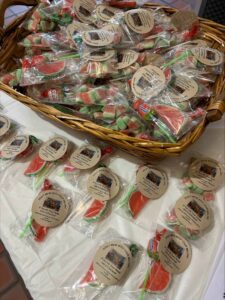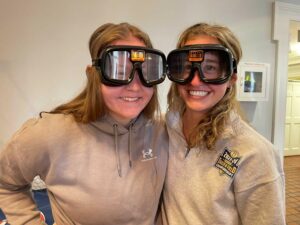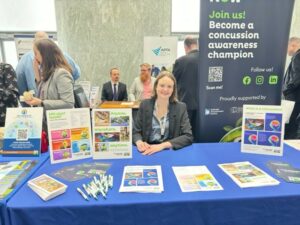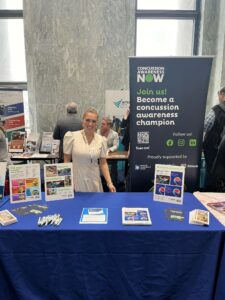April is National Volunteer Month—a way to celebrate the individual people, groups, and organizations who make it their mission to donate their time and talent to the causes they’re passionate about.
Here at Concussion Awareness Now (CAN), our volunteers—we call them “CAN Champions,” do exactly that. But it’s also more than that. CAN Champions perform a unique kind of volunteerism—one that we like to call “volunteer advocacy.” Whether it’s an individual or a group, being an advocate is all about addressing the need for change—and taking action to change it.
To illustrate the incredible impact of our volunteer advocates, we’d like to share three very different stories with one thing in common: to increase awareness and education about concussions and other forms of brain injury.
Thiel College faculty, staff, and students hold their own “Concussion Awareness Day”

A tiny independent college located in Greenville, Pennsylvania, Thiel College is home to approximately 750 students—one of the smallest colleges in their corner of the world. Not too small, however, to have their own Concussion Management Team, a group of students and faculty within the Department of Communications Sciences and Disorders.
The mission of the Concussion Management Team, according to Julie Kobak, an Associate Professor and Clinic Director within Thiel College’s Department of Communications Sciences and Disorders, is to ensure that every student who sustains a concussion has a safe and successful return to both athletic and academic activities. “The team meets at least once a month to “round” on the students in concussion protocol, and to plan activities that are focused on our goals,” she says.
In late March, the team hosted a “Concussion Awareness Day” in honor of National Brain Injury Awareness Month, creating a series of interactive activities to help their fellow students and educators understand concussion symptoms and what to do if they think they’ve sustained a concussion themselves.
Using CAN’s “Don’t Mess with Your Melon” branding, the team planned a variety of events to make concussion awareness fun, offering free popcorn, melon punch, melon candies, and melon stickers.

Students and educators also participated in physical and mental challenges while wearing concussion simulation goggles. Through simulated traumatic brain injury (TBI) symptoms such as dizziness, visual disconnect, disorientation, hesitation, and confusion, they were asked to perform a series of simple activities to understand what symptoms of a TBI or concussion might feel like in real life.

Kobak says the event was a success in terms of turnout and what the students learned. “Many of our students were aware of the multitude of symptoms that can occur following a concussion,” she says. “However, they learned more about the physiological changes that occur in this “invisible” injury. They also learned there is a whole team available to support them here at Thiel.”
“Statistics show that 50% of concussions go unreported,” Kobak continues, and says that research shows having greater concussion fact knowledge doesn’t always translate into a higher reporting of concussion. “Non-disclosure of concussion is driven more by situational pressures and attitudes, so I think the best part of holding events like this is that we’re not only increasing knowledge around concussions, but we’re also developing a culture of support.”
A huge thank you to Kobak and the Thiel Concussion Management Team for creating this event and sharing the outcome with us! We’re so happy that our resources were useful.
CAN Champions head to Washington D.C. for Brain Injury Awareness Day

Last month, CAN co-chair The Brain Injury Association of America (BIAA) and coalition members the National Association of State Head Injury Administrators (NASHIA) and United States Brain Injury Alliance (USBIA) gathered in Washington D.C. for Brain Injury Awareness Day on Capitol Hill to raise awareness about brain injury and support the reauthorization of the Traumatic Brain Injury Act. Members of the BIAA team brought the Concussion Awareness Now (CAN) booth to the Brain Injury Awareness Fair to share information and resources about concussion.
Nearly 250 brain injury survivors, their families, medical professionals, and partners from 38 states were part of Awareness Day, engaging in a total of 216 meetings with elected officials and their staff to share why they support the reauthorization of the TBI Act.
Individual CAN Champions use their story and experiences to create change
Last month, we also had the pleasure of speaking with two individual CAN Champions — Dr. Brooke Mills, and Dr. Christopher Chao. Dr. Mills—a former Miss New Hampshire 2023, recent graduate of the Sherman College of Chiropractic, and founder of National Concussion Awareness Day—is proof that a concussion can happen anytime, at any place, and to anyone.
In 2014, Dr. Mills was a freshman in high school when she was playing handball in a mandatory gym class. She and another classmate went after the same ball, and he ended up kicking the left side of her face—knocking her completely unconscious. What followed was a years-long journey to come to terms with “how things are” rather than “how things were.”
She began working as a peer-to-peer lecturer—sharing her story with middle and high school students and helping them gain concussion awareness—shortly after her concussion diagnosis and realized how much she loved it. A decade after her concussion occurred, Dr. Mills now speaks regularly about her experiences and encourages others to learn and keep an eye out for concussion symptoms. She even helped at our CAN booth for Brain Injury Awareness Day!

Dr. Chao, an urgent care physician and the President of the College of Urgent Care Medicine, also sees himself as a volunteer advocate—especially when it comes to helping other urgent care clinicians get the knowledge and resources they need to evaluate a patient for a potential concussion.
When we talked with Dr. Chao last month, we asked him what would be on his “wish list” when it comes to urgent care clinicians and concussion awareness. “Better resources and better continuity,” he said. “I’d like us to be better able to connect the dots between rehabilitation and follow-up care.” And, he’s actively doing his part by making sure his urgent care community is able to access those resources.
No matter if you’re an individual or a group, we’d love to have your support in helping to spread the word about concussion symptoms and care. Join our cause and become a Concussion Awareness Now champion here.
